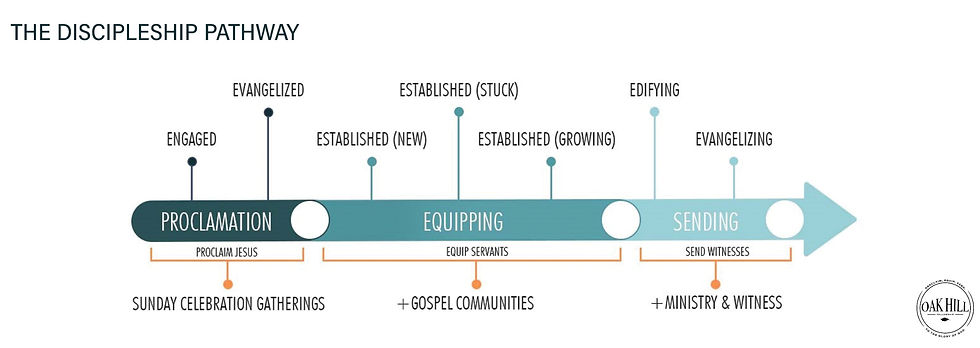Relational Discipleship and Care
- Pastor Ben
- Mar 22, 2022
- 4 min read
In J.R.R. Tolkien's famous novel, The Hobbit, Bilbo Baggins finds himself on an adventure with a band of dwarves on a pursuit to plunder a dragon's spoil of gold. At one point along the way, Bilbo finds himself separated from his friends, wandering further and further into the depths of a mountain cave, surrounded entirely by darkness. It is at the bottom of this cavern that he encounters Gollum, the pitiful creature who guards a powerful ring that he calls, "Precious."
As Tolkien describes the scene you can feel the danger in Bilbo's isolation from the dwarves as well as the destructive nature of Gollum's isolation from society. Bilbo almost wishes his own death, while Gollum is so suspicious of the hobbit's motives that he is ready to eat him alive. The evil ring has enslaved Gollum so that his heart has become as dark as the cavern in which he lives. While Bilbo narrowly escapes with the help of the ring's power, Gollum is left alone without his prized possession.

Tolkien's scene imaginatively illustrates the fact that isolation is a dangerous and destructive existence. Proverbs 18:1 says, "Whoever isolates himself seeks his own desire; he breaks out against all sound judgment." (ESV). This is true because, "Without counsel plans fail, but with many advisers they succeed" (Proverbs 15:22 ESV). We see this in the life of the demoniac that Jesus encountered among the tombs in the country of the Gerasenes. Demons of the domain of darkness destroyed this man's life, in part, by isolating him from his family, friends, and culture. On the contrary, Jesus restored this man to his friends, instructing him to tell them about what Jesus had done.
This is why we are devoted to Gospel Community at Oak Hill. We need one another so that we don't fall prey to the enemy's temptations and accusations. The author of Hebrews wrote, "Take care, brothers, lest there be in any of you an evil, unbelieving heart, leading you to fall away from the living God. But exhort one another every day, as long as it is called “today,” that none of you may be hardened by the deceitfulness of sin" (Hebrews 3:12–13 ESV). If we believe this verse and take it seriously, we will embrace Gospel Community as a vital component in our walk with Jesus.
When I teach membership class, I explain that our primary value in Gospel Community is "Relational Discipleship and Care." I recently dissected this goal with the Gospel Community leaders and apprentices, and I want to do that here as well.
First, let's define discipleship. Discipleship is one of those Christian words that is too quickly used and too infrequently defined. At Oak Hill, we say "a disciple is someone who is growing in their dependence on and devotion to Jesus." Therefore, discipleship is simply helping one another take the next step in their walk with Jesus. Those words, "one another" are important. We'll come back to them later. For now, think of discipleship as the "spiritual" or "heart-level" component of gospel communities.
Second, let's define care. If discipleship is the spiritual component, care is the physical or practical component. We all face practical needs to varying degrees as we live out our walk with Christ. Sometimes these needs come from exceptional trials, other times from exceptional ministry opportunities, and still other times from sinful patterns that we are seeking to overcome.
As Paul wrote to the Galatians to restore any brother caught in sin, he instructed them to, "Bear one another’s burdens, and so fulfill the law of Christ.... For each will have to bear his own load" (Galatians 6:2, 5 ESV). We may ask, "So which is it? Do we bear each other's burdens, or are we each expected to carry our own load?" The answer is both. A "load" is a word for a weight specifically suited to the one carrying it. A "burden" on the other hand, was a word describing something too big for the one carrying it. We each must carry our own load in repentance - the responsibility of daily choices are ours. However, dealing with sin creates challenges and burdens that are often too big for us to handle on our own. That's where the Gospel Community can effectively provide care for the sake of growth in Christ.
In Paul's instructions to the Galatians, we see the value of the easily overlooked "and" in our purpose statement, "Discipleship AND Care." The power is in the combo. We care physically so that we can disciple spiritually. We disciple spiritually knowing that our physical circumstances influence our ability to interpret the world around us, leading us to care.
But how does a Gospel Community do this? How do we help one another take the next step in following Jesus? How do we know what practical needs require our care? The answer is all throughout this article and all throughout the New Testament, and it's found in the two words, "one another." This is what we mean by relational: practicing the one another commands of scripture. We should be deeply acquainted with these instructions, and realize that they are truly commands, given by our Lord Jesus for the benefit of his church. They are not suggestions to consider but commands to obey.
If we truly lay hold of these relational commands in the power of the Spirit, we will see disciples grow into the likeness of Christ, and we will see the Lord care for every member's needs through the family of families, the church. The call to Gospel Community drives right at the heart of the enemy's tactic to isolate us. Isolation is dangerous and destructive. Gospel Community allows the life of Jesus to come to life in us. Which will you choose?




Comments